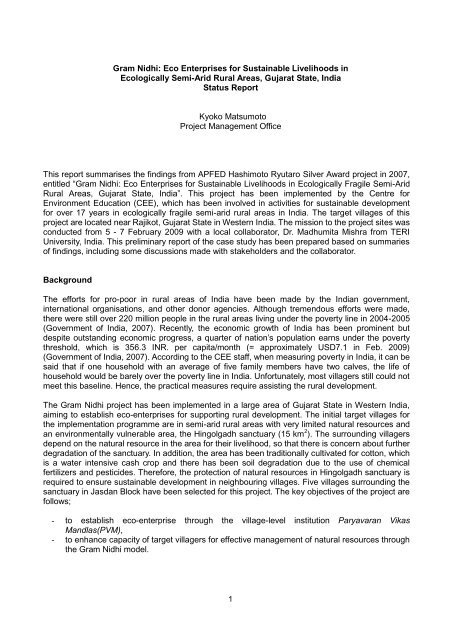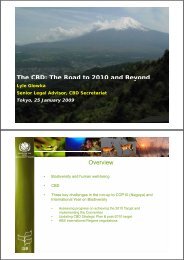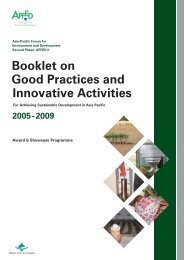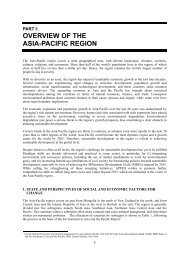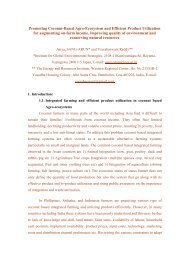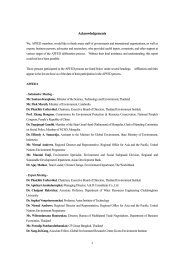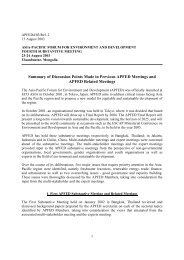Case Study Status Report on Gram Nidhi - APFED
Case Study Status Report on Gram Nidhi - APFED
Case Study Status Report on Gram Nidhi - APFED
Create successful ePaper yourself
Turn your PDF publications into a flip-book with our unique Google optimized e-Paper software.
<strong>Gram</strong> <strong>Nidhi</strong>: Eco Enterprises for Sustainable Livelihoods in<br />
Ecologically Semi-Arid Rural Areas, Gujarat State, India<br />
<str<strong>on</strong>g>Status</str<strong>on</strong>g> <str<strong>on</strong>g>Report</str<strong>on</strong>g><br />
Kyoko Matsumoto<br />
Project Management Office<br />
This report summarises the findings from <strong>APFED</strong> Hashimoto Ryutaro Silver Award project in 2007,<br />
entitled “<strong>Gram</strong> <strong>Nidhi</strong>: Eco Enterprises for Sustainable Livelihoods in Ecologically Fragile Semi-Arid<br />
Rural Areas, Gujarat State, India”. This project has been implemented by the Centre for<br />
Envir<strong>on</strong>ment Educati<strong>on</strong> (CEE), which has been involved in activities for sustainable development<br />
for over 17 years in ecologically fragile semi-arid rural areas in India. The target villages of this<br />
project are located near Rajikot, Gujarat State in Western India. The missi<strong>on</strong> to the project sites was<br />
c<strong>on</strong>ducted from 5 - 7 February 2009 with a local collaborator, Dr. Madhumita Mishra from TERI<br />
University, India. This preliminary report of the case study has been prepared based <strong>on</strong> summaries<br />
of findings, including some discussi<strong>on</strong>s made with stakeholders and the collaborator.<br />
Background<br />
The efforts for pro-poor in rural areas of India have been made by the Indian government,<br />
internati<strong>on</strong>al organisati<strong>on</strong>s, and other d<strong>on</strong>or agencies. Although tremendous efforts were made,<br />
there were still over 220 milli<strong>on</strong> people in the rural areas living under the poverty line in 2004-2005<br />
(Government of India, 2007). Recently, the ec<strong>on</strong>omic growth of India has been prominent but<br />
despite outstanding ec<strong>on</strong>omic progress, a quarter of nati<strong>on</strong>’s populati<strong>on</strong> earns under the poverty<br />
threshold, which is 356.3 INR. per capita/m<strong>on</strong>th (= approximately USD7.1 in Feb. 2009)<br />
(Government of India, 2007). According to the CEE staff, when measuring poverty in India, it can be<br />
said that if <strong>on</strong>e household with an average of five family members have two calves, the life of<br />
household would be barely over the poverty line in India. Unfortunately, most villagers still could not<br />
meet this baseline. Hence, the practical measures require assisting the rural development.<br />
The <strong>Gram</strong> <strong>Nidhi</strong> project has been implemented in a large area of Gujarat State in Western India,<br />
aiming to establish eco-enterprises for supporting rural development. The initial target villages for<br />
the implementati<strong>on</strong> programme are in semi-arid rural areas with very limited natural resources and<br />
an envir<strong>on</strong>mentally vulnerable area, the Hingolgadh sanctuary (15 km 2 ). The surrounding villagers<br />
depend <strong>on</strong> the natural resource in the area for their livelihood, so that there is c<strong>on</strong>cern about further<br />
degradati<strong>on</strong> of the sanctuary. In additi<strong>on</strong>, the area has been traditi<strong>on</strong>ally cultivated for cott<strong>on</strong>, which<br />
is a water intensive cash crop and there has been soil degradati<strong>on</strong> due to the use of chemical<br />
fertilizers and pesticides. Therefore, the protecti<strong>on</strong> of natural resources in Hingolgadh sanctuary is<br />
required to ensure sustainable development in neighbouring villages. Five villages surrounding the<br />
sanctuary in Jasdan Block have been selected for this project. The key objectives of the project are<br />
follows;<br />
- to establish eco-enterprise through the village-level instituti<strong>on</strong> Paryavaran Vikas<br />
Mandlas(PVM),<br />
- to enhance capacity of target villagers for effective management of natural resources through<br />
the <strong>Gram</strong> <strong>Nidhi</strong> model.<br />
1


